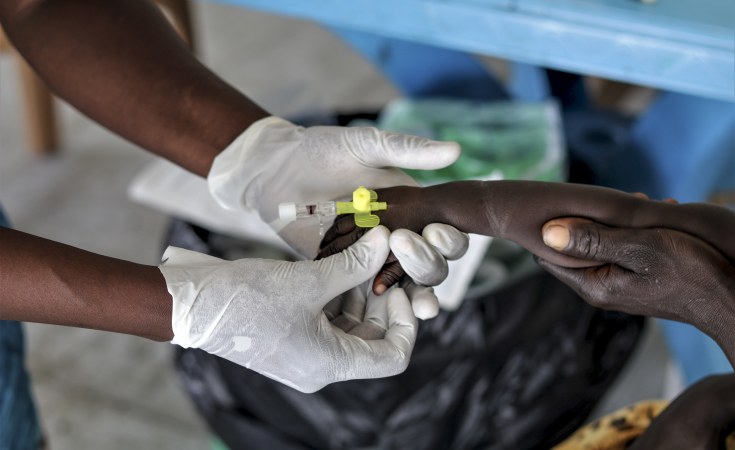Madagascar is one of the countries most affected by malaria. According to the Ministry of Public Health, the reported number of malaria cases in 2023 exceeded the national epidemic threshold: 2.8 million cases and 400 deaths were recorded, compared to 1.7 million in 2022.
In Ikongo district, where Médecins Sans Frontières (MSF) is providing health and nutritional care, people are struggling with a dual crisis of malaria and malnutrition, worsened by geographical challenges. Children under five are particularly at risk of complications. According to USAID, malaria affects around 7.5 per cent of children under five in the country.
Rainy season impedes healthcare access
The malaria peak season coincides with the cyclone and rainy season, from October to May. During this time, it becomes extremely difficult for people to access health centres, leading people to only seek medical care when their health has deteriorated to a critical condition. This also puts the lives of malnourished children at even greater risk.
"When the rain is heavy, providing care for children becomes difficult. The roads become muddy, flooded, and unusable," says Dr Nantenaina, a medical doctor at the Intensive Therapeutic Feeding Centre (ITFC) run by MSF. "It is a struggle for both health workers and patients to move around, making it hard for patients to access to health centres or for us to send them back home."
In hard-to-reach areas like Ikongo, the distance between households and healthcare facilities is significant. Soanary, the mother of a 4-year-old boy suffering from malnutrition and malaria, describes her journey.
"After seeing my son's condition deteriorate, I decided to go to the nearest health centre," says Soanary. "To get here, I had to walk for four hours and cross through water, carrying my son on my back."
When the rain is heavy, providing care for children becomes difficult. The roads become muddy, flooded, and unusable. It is a struggle for both health workers and patients to move around. Dr. Nantenaina, a medical doctor at the Intensive Therapeutic Feeding Centre run by MSF
Share this
Climate change at the heart of the crisis
Madagascar is one of the countries most threatened by climate change. The country has been severely affected by extreme weather events, which have challenged access to health facilities and undermined the overall state of health and nutrition, playing a significant role in the rise of cases
According to World Health Organization, the rates of malaria cases and deaths due to this disease increased by 25 per cent to 55 per cent between 2015 and 2022. Additionally, the 2023 World Malaria Report highlights that these rates surged by more than 100 per cent between 2000 and 2022.
Changes in temperature and rainfall, as well as significant heat waves and floods, can impact the behavior and survival of the Anopheles mosquito, leading to increased disease transmission within communities. In Ikongo district, which already experiences a humid tropical climate, the effects of climate change are particularly severe.
Moreover, many villages in Ikongo are surrounded by marshes and rivers. Heavy rains cause flooding of plantations and rice fields, worsening the already precarious malnutrition situation in the area.
"During the rainy season, our health centres receive a lot of cases of malaria," says Evelyne, a nurse at the Ikongo primary health centre.
"We have at least one new case of a malnourished child who also suffers from severe malaria every week during the rainy season," says Dr Nantenaina.
MSF has been present in Ikongo since 2022. Between then and March 2024, MSF medical teams, in cooperation with Malgasy health authorities and health promoters, have diagnosed and treated 2,205 children suffering from both malnutrition and malaria, including 256 cases this year. In response to food insecurity exacerbated by various climatic phenomena and cyclones, MSF teams have increased activities in the southern part of the country, which has been the most affected. Currently, MSF is supporting seven basic health centres and two intensive nutritional clinics to diagnose and treat malnourished children in Ikongo district.


